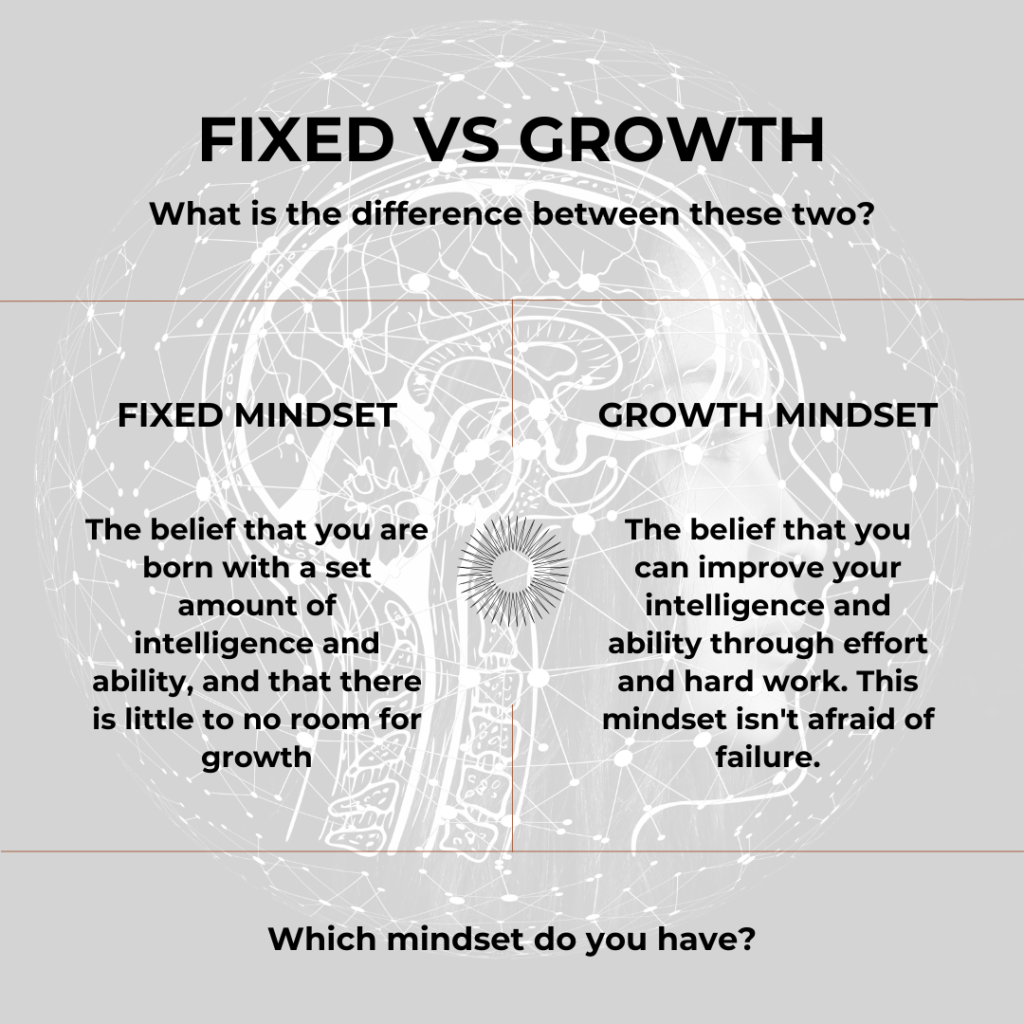Mindset is your internal belief system about who you are and your capabilities. It shapes how you approach challenges, setbacks, and ultimately, success. There are two main mindsets:
Fixed Mind: Believes intelligence and abilities are predetermined and unchangeable. Fears failure and avoids challenges. Sees setbacks as proof of limitations.
Growth Mind: Believes intelligence and abilities can be developed through effort and learning. Accept challenges and sees setbacks as learning opportunities. Celebrates personal growth and the success of others.
Your mind impacts everything from academics and career to relationships and mental health. The good news? Mentality can shift! By confronting self-limiting ideas, accepting difficulties, and acknowledging advancements, you can develop a growth mentality and realize your greatest potential.
Table of Contents
Shifting from a Fixed to a Growth Mindset
Imagine two students taking the same exam. One, with a fixed mindset, believes their intelligence is predetermined and unchangeable. They see the test as a judgment of their inherent ability. The other, with a growth mindset, views intelligence as malleable and believes in the power of effort and learning. They see the test as an opportunity to learn and grow.
The Power of Mindset
Our attitudes influence how we respond to obstacles, failures, and eventually achievement. According to research by Stanford psychologist Carol Dweck, those who have a fixed mindset typically do the following:
- Avoid challenges: They fear failure, believing it reflects poorly on their intelligence.
- Give up easily: Faced with obstacles, they quickly lose motivation and quit.
- Be critical of themselves and others: They judge themselves and others harshly based on performance.

On the other hand, those with a growth mindset:
- Accept challenges: They see difficulties as opportunities to learn and grow.
- Persist through setbacks: They view mistakes as learning experiences and bounce back from failures.
- Celebrate the success of others: They are inspired by the achievements of others and see them as opportunities to learn.
The impact of mentality extends far beyond academics. Studies have shown that a growth mentality leads to:
- Higher academic achievement (Blackwell et al., 2007)
- Greater resilience (Duckworth et al., 2007)
- Improved mental and physical health (Yeager et al., 2014)
- Enhanced job performance (Dweck, 2008)
Shifting Your Mindset
The good news is that mindsets are not fixed. Dweck’s research suggests that we can cultivate a growth mind through deliberate effort. Here are some practical tips:
- Challenge your fixed-mind beliefs: Identify your self-limiting thoughts and replace them with growth-oriented ones. For example, instead of thinking “I’m bad at math,” tell yourself, “Math is challenging, but I can get better with practice.”
- Accept challenges: View difficulties as opportunities to learn and grow. Step outside your comfort zone and try new things.
- Celebrate effort and progress: Focus on the hard work you put in, not just the outcome. Recognize and celebrate your progress, no matter how small.
- Learn from mistakes: See mistakes as valuable learning experiences. Analyze what went wrong and use it to improve next time.
- Seek feedback: Actively seek constructive feedback from others and use it to learn and grow.
- Surround yourself with positive people: Spend time with people who have a growth prospective and who will support your journey.
Remember, changing your mentality is a journey, not a destination. Be patient with yourself, celebrate your progress, and never stop learning and growing.
Additional Tips
- Practice mindfulness: Mindfulness can help you become more aware of your thoughts and feelings, and to choose how you respond to them.
- Visualize success: Imagine yourself achieving your goals. This can help to boost your motivation and confidence.
- Use positive affirmations: Repeat positive statements about yourself and your abilities.
- Reward yourself for progress: Celebrate your successes, no matter how small.
By following these tips, you can unlock your full potential and achieve your goals.
Conclusion
Our mind have a profound impact on our lives. By shifting from a fixed to a growth mentality, we can open ourselves up to new possibilities and achieve greater success. Thus, take on the task, venture beyond your comfort zone, and begin developing a growth mind right now.
Sources
- Blackwell, L. S., Dweck, C. S., & Dweck, C. S. (2007). Positive psychology in the classroom. SAGE Publications, Inc.
- Duckworth, A. L., Peterson, C., Matthews, M. D., & Kelly, D. R. (2007). Grit: Perseverance and passion for long-term goals. Journal of personality and social psychology, 92(1), 108.
- Dweck, C. S. (2008). Mindset: The new psychology of success. Random House.
- Yeager, D. S., Dweck, C. S., Walton, G. M., & Sandler, T. M. (2014). Mindsets predict student resilience in the face of setbacks. Journal of Educational Psychology, 106(4), 550.
Check out our blog for insightful articles about motivation, finance, and business. It’s a unique location where practical advice and thought-provoking concepts collide. Come hang out at Blog Narrator to stay informed, inspired, and on course to accomplish your professional and personal objectives.
